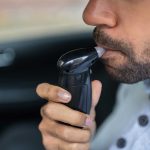- What Is Rhinophyma?
- Does Alcohol Cause Rhinophyma?
- Causes Of Rhinophyma
- Treating Rosacea & Rhinophyma
- Effects Of Alcohol Abuse On The Face
Alcohol use disorder is a widespread medical condition that impacts every organ of the body. But is chronic alcohol abuse responsible for the condition known as drinker’s nose, and what other effects can it have on your face and skin?
What Is Rhinophyma?
Rhinophyma is a rare skin disorder.
The symptoms of rhinophyma include an abnormally enlarged, bulbous, thickened, purple or red nose with a waxy surface, visible blood vessels, and enlarged pores.
It is most common among men of English, Irish, Scottish, Scandinavian, or eastern European heritage with fair skin between the ages of 50 and 70.
Because it is such an obvious condition, rhinophyma has developed a number of different informal names including whiskey nose, gin nose, pickle nose, cauliflower nose, bulbous nose, and alcoholic nose. However, a drinker’s nose is probably the most common.
Does Alcohol Consumption Cause Rhinophyma?
Rhinophyma is not caused by drinking alcohol and occurs both in those who do not drink as well as those who drink heavily.
However, certain studies have found significant correlations between heavy alcohol consumption and the severity of rhinophyma cases.
While alcohol does not cause rhinophyma, it does appear to be linked with it in certain cases and may potentially worsen an existing case of rhinophyma.
The Link Between Alcohol & Rhinophyma
Proposed explanations for the correlation between alcohol and rhinophyma include:
- rhinophyma’s prevalence among men, as men both drink more and more often than women and are also likelier to develop this skin condition
- alcohol’s action as a vasodilator, increasing flushing and vasodilation in the face and potentially contributing to rhinophyma’s severity over time
- alcohol’s systemic effects on the human body, impairing immune action and generally worsening preexisting skin conditions
- possible linked genetic predispositions to both alcohol abuse and rhinophyma, evidenced by family histories of each condition
- rhinophyma’s negative influence on self-consciousness and social participation, potentially contributing to alcohol misuse as a coping mechanism
Causes Of Rhinophyma
Drinker’s nose is actually caused by a common, chronic skin disorder known as rosacea.
While the cause of rosacea isn’t fully understood, it’s believed to involve a combination of an overactive immune response, genetics, and environmental factors. It is not contagious and cannot be cured, though it can be managed in different ways.
Symptoms Of Rosacea
Symptoms of rosacea include swollen red patches of skin and acne-like pus-filled pimples or bumps, which often develop all at once in response to triggers like spicy foods, red wine, stress, certain skincare products, or sun or wind exposure.
These symptoms will then last for a period of time before fading away and eventually recurring as yet another flare-up.
How Common Is Rosacea?
Rosacea is most common among middle-aged women of European heritage, but it can affect anyone. And when rosacea flare-ups spread to the nose in certain men, rhinophyma is a possible result.
Treating Rosacea & Rhinophyma
Rosacea outbreaks can be treated in a variety of ways, including:
- topical drugs and creams to constrict blood vessels and reduce mild flushing or minimize pimple formation
- oral antibiotics to help control moderate to severe rosacea-linked acne
- isotretinoin, a synthetic form of vitamin A that can help clear up severe or treatment-resistant rosacea lesions by reducing the size of sebaceous glands in the skin after a six-month course of treatment
Be aware that isotretinoin is associated with a variety of potentially serious side effects that should be carefully explained to you by a dermatology expert prior to beginning treatment.
Treatment options for rhinophyma include:
- certain acne medications, similar to the treatment of less-severe forms of rosacea
- plastic surgery to reshape the nose using a laser system, scalpel, or dermabrasion.
The Effects Of Alcohol Abuse On The Face
Though it may not cause a drinker’s nose, excessive alcohol consumption can still affect your appearance in a number of ways:
- alcohol is a diuretic and contributes to chronic dehydration, accentuating dry skin and wrinkles and dulling the “glow” of healthy skin
- alcohol addiction is strongly associated with chronic sleep dysfunction, poor immune function, and loss of critical vitamins and minerals, resulting in premature aging
- alcohol abuse is associated with dilated blood vessels in the eyes, leading to redness
- alcohol can trigger rosacea flare-ups
If you or a loved one lives with alcohol addiction, Northeast Addictions Treatment Center can help. To learn about our substance abuse services, including mental health counseling and other tools for addiction recovery, please contact us today.
Alcohol Addiction Treatment
-
Outpatient Drug Rehab for Addiction Treatment
Taking advantage of outpatient rehab can help a person overcome the substance abuse lifestyle, while gaining access to group counseling, individual therapy and classes. People in recovery can learn skills to help manage stress...
-
Motivational Interviewing for Substance Abuse
Motivational Interviewing (also called MI, for short) is a counseling method that helps people find genuine internal motivation to solve and address problems in their life. In the context of substance abuse treatment, MI is...
-
Day Treatment – Partial Hospitalization (PHP)
-
Dual Diagnosis Treatment
-
Substance Abuse Group Therapy
-
What is Cognitive Behavioral Therapy (CBT)?
-
12 Step Program for Addiction Treatment
Sources
Written by
Northeast Addition Editorial Team
©2024 Northeast Addition Center | All Rights Reserved
This page does not provide medical advice.





